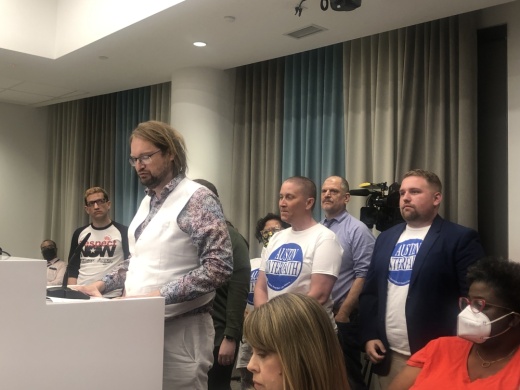Austin ISD trustees accepted an application from NXP Semiconductors for an agreement that would give the chipmaking company tax incentives to expand its Austin facilities, and keep millions of dollars out of the district’s recapture payment.
The board authorized the application’s submission to the Texas Comptroller of Public Accounts for review and approval at a May 19 meeting. Five trustees voted in favor. District 2 trustee Ofelia Zapata and District 8 trustee Noelita Lugo voted against, while District 9 trustee Arati Singh abstained.
The board reviewed a presentation on the proposed agreement between AISD and NXP last week. NXP’s proposal is based on Texas state law Chapter 313, which allows public school districts to offer companies that build up property and create jobs in their communities up to 10 years of property tax breaks. In exchange, the companies pay for a portion of the district’s property taxes.
High property values and tax rates contribute to AISD’s sizable recapture payment, which will reach an estimated $846 million next year, according to district Media Relations Manager Cristina Nguyen. Recapture refers to tax revenue collected from school districts with higher property values that is paid to the state, then redistributed to lower-wealth districts.
Austin ISD pays the highest amount in recapture of any Texas school district. The agreement with NXP would allow the district to keep nearly $67 million out of state recapture payments.
NXP’s final application submitted on May 19 proposed a $2.6 million expansion at one or both of the company’s existing Austin facilities, the Oak Hill Facility on William Cannon Drive and the Austin Technology and Manufacturing Center (ATMC) on Ed Bluestein Blvd. The agreement would create a total of 500 jobs paying an annual salary of about $68,500.
NXP’s consulting firm Kroll reported last week that the agreement with AISD would create an estimated 800 jobs paying an annual salary of over $100,000.
Job numbers in the initial proposal were estimates and the application does not reflect final salaries, according to Kroll representative Michael Lateur.
The majority of community members who provided testimony on May 19 asked the board to vote against the Chapter 313 agreement with NXP. Many speakers were members of Central Texas Interfaith, a nonpartisan coalition of congregations, schools and unions that opposes Chapter 313.
“Hardworking taxpayers don’t get this kind of giveaway. Nor do small businesses, or responsible corporations,” said Central Texas Interfaith leader Trenton Henderson. “We want our money to go to public schools, but not to pay the bills for corporations shirking their responsibility to public education. Without a Chapter 313 agreement, NXP would have to pay their full share of school taxes, which would directly benefit Texas schoolchildren.”
AISD’s legal counsel Thompson and Horton LLP denied that other school districts would lose money if AISD entered into a Chapter 313 agreement.
“If you choose not to pursue the Chapter 313 agreement and recapture increases, other schools won’t see a dollar,” said Thompson and Horton partner David Thompson.
Accepting the Chapter 313 application is not binding to the district or NXP. Further information and discussions will occur before a final agreement can be approved. If the state approves the agreement, the board would consider negotiating and entering into a final agreement.
The Chapter 313 program will end in December 2022, after state legislators declined to renew it during the 2021 legislative session. The Texas Comptroller’s Office requests that all Chapter 313 applications be submitted by June 1, to assure sufficient time for processing and approvals.





